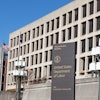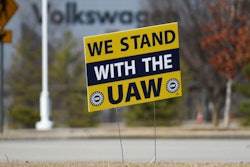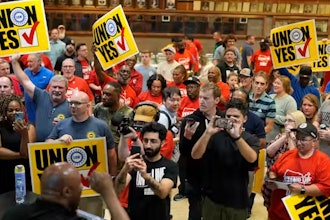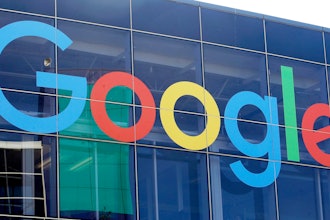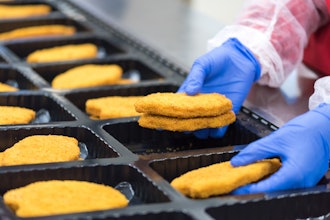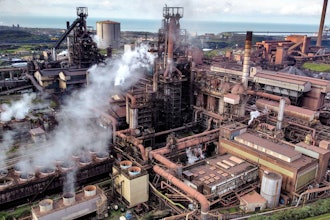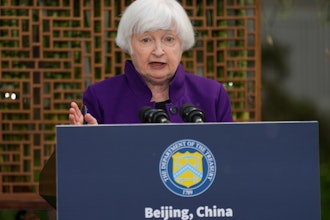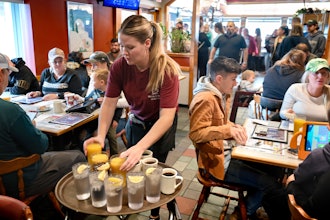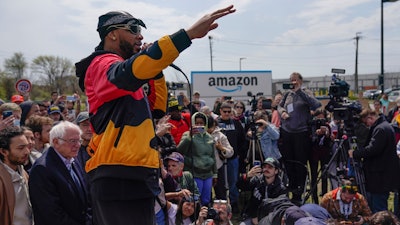
Two years after clinching a historic victory at a warehouse in New York City, the first labor union for Amazon workers in the United States is divided, running out of money and fighting over an election that could determine who will lead the group in the near future.
Despite campaigns at several facilities in the past few years, the warehouse on Staten Island still is the only site in the U.S. where the retail giant's workers have voted in favor of union representation. Cracks emerged within the Amazon Labor Union ranks after it lost the votes at a second Staten Island warehouse and at one in upstate New York, spurring disagreements about the group's organizing strategy.
Some felt Chris Smalls, the union's president, spent too much time traveling and giving speeches instead of focusing on Staten Island, where the union still does not have a contract with Amazon. Prominent members resigned quietly or left to form a dissident labor group, which sued the union in federal court last summer to force an election for new leadership.
Although many of the union's problems are internal, it also continues to face roadblocks from Amazon, which has resisted efforts to come to the bargaining table despite pressure from federal labor regulators to do so.
The company, for its part, has accused the National Labor Relations Board and the ALU of improperly influencing the outcome of the successful unionization vote. Amazon also claims the results - 2,654 in favor and 2,131 against - do not represent what the majority of employees want. About 8,300 people worked at the JFK8 Fulfillment Center at the time of the April 2022 vote.
"When the law allows management to drag out negotiations over years, and to use legal arguments to delay the progress that the workers have begun, it's just an enormous hurdle," said Benjamin Sachs, a labor law professor at Harvard University.
In January, months after the splinter group called A.L.U. Democratic Reform Caucus filed its lawsuit, the union agreed to a court-brokered plan to allow rank-and-file members to vote on whether to hold an election for a slate of new officers. For five days that ended in early March, tables with ballots were set up outside the doors of the massive Staten Island warehouse. Smalls and other union leaders campaigned against the election, but the vote didn't go their way.
In court documents, Arthur Schwartz, an attorney who represents the dissident caucus, said that of the roughly 350 union members who voted, 60% favored having an officer election in June or July.
The referendum, which had a low turnout rate, didn't settle the legal back-and-forth and internal power plays. Last week, Jeanne Mirer, an attorney for the union, argued in a legal filing that the federal court in New York should reopen the court-brokered plan. She called it a "flawed" agreement that violated the union's constitution.
According to Mirer, the current ALU governing document requires members to pass an amendment or arrange a constitutional convention if they want to hold an officer election before a collective bargaining agreement is negotiated with Amazon. The current leaders also say the union has run out of money, which makes it challenging for them to conduct an election.
"It doesn't matter who's in the chair," Mirer said during an interview. "Anybody who is a leader has to get Amazon to the table, and working against each other isn't going to do it."
Schwartz, the attorney for the dissidents, called the union's legal claims "totally baseless," arguing that the constitution at issue was imposed by Smalls – without a vote - in late 2022. He noted that the neutral monitor overseeing the implementation of the court-brokered plan - labor attorney Richard Levy - has scheduled candidate nomination meetings for May, which could allow an internal election to be held as early as June 11.
Smalls, a former Amazon worker who co-founded the union during the coronavirus pandemic, did not respond to multiple requests for an interview. Last year, he told the New York Times that he traveled to help raise money for the union. He also told financial news website Business Insider in December that he would not seek reelection as ALU president.
Meanwhile, two other prominent organizers, Connor Spence, the union's co-founder and former treasurer, and Michelle Valentin Nieves, a union leader who says she was pushed out of the group last year, have thrown their hats in the ring. Amazon fired Spence last year for violating a company policy that forbids workers from accessing company buildings or outdoor work areas when they're off the clock, a policy critics say is designed to hinder organizing. He's leading the A.L.U. Democratic Reform Caucus, while Valentin Nieves is running her own independent campaign.
Valentin Nieves, who helps run the conveyor belts at the warehouse that unionized, said she felt frustrated during her time in the ALU by how much Smalls traveled, alleging that he missed weekly financial meetings for five months straight. She said she spoke with him about reducing his time away and encouraged him to periodically go to public bus stop near the warehouse, where many workers gathered after their shifts ended. But she said Smalls didn't take her advice.
"We need someone that is here. We need a contract and we need to organize the building," Valentin Nieves said. "If we're not able to do this, it's going to have a domino effect, and a lot of Amazon workers are going to lose hope."
One Amazon worker on Staten Island, Keanu Rivera, 28, said he voted in favor of the union two years ago and sometimes reads the emails he receives from the labor group. Rivera said he used to see organizers talking to workers all the time before the representation vote two years ago.
These days, he says there's not much of that, a problem exacerbated by the Amazon policy restricting off-duty activity in work areas.
"It's all Amazon," Rivera said. "Amazon got the money to stall them."
In addition to the vigorous legal pushback against the union's win, the company has continued to spend millions on labor consultants who often try to persuade workers against joining a union. In 2023 alone, Amazon spent more than $3 million on such consultants for its delivery network, a target of the Teamsters union.
Last month, the National Labor Relations Board filed a complaint against Amazon, alleging the company illegally attempted to disrupt organizing efforts by an independent union associated with the ALU at an air hub in Kentucky. Amazon spokesperson Mary Kate Paradis said that complaint was "without merit."
"We will continue to defend our position as the legal process continues," Paradis said.
Back in New York, organizers pushing for the internal election have their work cut out for them. They still need to secure a new mailing list for all the workers at the Staten Island warehouse, which has high turnover. Schwartz, the attorney for the dissidents, has asked the court to intervene so candidates whom the NLRB determined were illegally fired, such as Spence, can campaign in non-work areas of Amazon's property.
"The hope of the caucus," he said, "is that we really use the election process to reenergize people in the plant."



